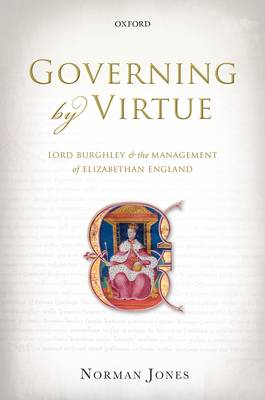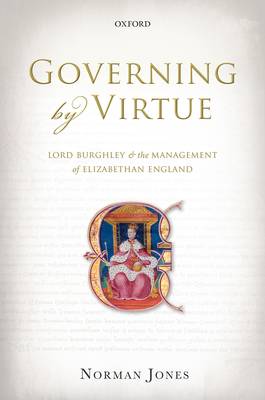
Door een staking bij bpost kan je online bestelling op dit moment iets langer onderweg zijn dan voorzien. Dringend iets nodig? Onze winkels ontvangen jou met open armen!
- Afhalen na 1 uur in een winkel met voorraad
- Gratis thuislevering in België vanaf € 30
- Ruim aanbod met 7 miljoen producten
Door een staking bij bpost kan je online bestelling op dit moment iets langer onderweg zijn dan voorzien. Dringend iets nodig? Onze winkels ontvangen jou met open armen!
- Afhalen na 1 uur in een winkel met voorraad
- Gratis thuislevering in België vanaf € 30
- Ruim aanbod met 7 miljoen producten
Zoeken
Governing by Virtue
Lord Burghley and the Management of Elizabethan England
Norman Jones
Hardcover | Engels
€ 233,95
+ 467 punten
Omschrijving
Managing early modern England was difficult because the state was weak. Although Queen Elizabeth was the supreme ruler, she had little bureaucracy, no standing army, and no police force. This meant that her chief manager, Lord Burghley, had to work with the gentlemen of the magisterial classes in order to keep the peace and defend the realm. He did this successfully by employing the shared value systems of the ruling classes, an improved information system, and gentle coercion. Using Burghley's archive, Governing by Virtue explores how he ran a state whose employees were venal, who owned their jobs for life, or whose power derived from birth and possession, not allegiance, even during national crises like that of the Spanish Armada.
Specificaties
Betrokkenen
- Auteur(s):
- Uitgeverij:
Inhoud
- Aantal bladzijden:
- 258
- Taal:
- Engels
Eigenschappen
- Productcode (EAN):
- 9780199593606
- Verschijningsdatum:
- 1/12/2015
- Uitvoering:
- Hardcover
- Formaat:
- Genaaid
- Afmetingen:
- 155 mm x 236 mm
- Gewicht:
- 521 g

Alleen bij Standaard Boekhandel
+ 467 punten op je klantenkaart van Standaard Boekhandel
Beoordelingen
We publiceren alleen reviews die voldoen aan de voorwaarden voor reviews. Bekijk onze voorwaarden voor reviews.











